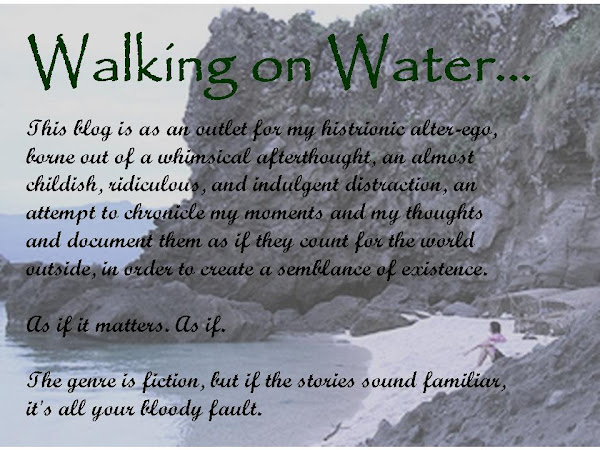It's 5PM. The office is quiet. Everyone has gone home. Everyone, except me - always the first to arrive, the last to leave. I hear shuffling of feet from the Senior Residents' Office above me, a murmur of voices, then raucous laughter. Reminds me of who we were one year ago. Now, I do not know. There is no callroom to go home to. No one to gripe with. One must learn to keep one's thoughts bottled in. One must cry alone if it's necessary to do so. These days, tears are not a sign of weakness, but more of an offering, a gift of honesty toward one's self.
I find myself in the office rather often these days. At 10 PM, sometimes I'm still here, toying with my computer, twirling around my swivel chair like a little child. I just gaze and stare at the piles of paper on my desk. I never even attempt to gather the courage and energy to discard whatever is useless. I just stare and stare until my stomach tells me it's time for my evening tea.
Today, while going through my usual habit of staring, my eyes were suddenly fixed on a certain book. It was a hard-bound copy of a collection of poems by Emily Dickinson. I've loved this book. I adore this poet and her works. I opened the book and was surprised I've actually made some notes on some poems. I had several post-its stuck on the pages, with my comments (evidence of my somewhat geeky personality).
Emily Dickinson was a recluse. She spent most of her life in a room on the second floor of her father's house. She wrote almost two thousand poems. She rarely descended from her little room, because she claimed, "To live is so startling". She lived until the young age of fifty-five.
This short and secluded life, however, is not mirrored by her writings. Her poems are full of feeling, full of life, as if she has lived and relished every emotion that a human being can be capable of feeling in a huge and exciting universe. Emily lived and died a recluse. But I could not help but wonder: Before she decided to renounce life as ordinary people knew it, did anything happen to Emily?
Here are some of my theories that I derived from a few of my favorite lines:
1. Did she hope, then suddenly lost everything she hoped for?
Except the heaven had come so near,
So seemed to choose my door,
The distance would not haunt me so;
I had not hoped before.
But just to hear the grace depart
I never thought to see,
Afflicts me with a double loss;
'T is lost, and lost to me.
2. Did she suffer unspoken affection?
I hide myself within my flower,
That wearing on your breast,
You, unsuspecting, wear me too -
And angels know the rest.
I hide myself within my flower,
That, fading from your vase,
You, unsuspecting, feel for me
Almost a loneliness.
3. The agony of unrequited love?
Proud of my broken heart since thou didst break it,
Proud of the pain I did not feel till thee,
Proud of my night since thou with moons dost slake it,
Not to partake thy passion, my humility.
I'm also a spinster who has virtually exiled herself in a room, not a physical one, but a psychological room I rarely come down from. What now? Hey, Emily? Why?
I realize I don't want to be Emily Dickinson. I can borrow her lines but not her life. "To live is so startling." Yes, I agree with her. But that's exactly the same reason why it is glorious to be alive!
I closed the book, placed it back on the shelf. Then, something fell. It was a folded piece of paper from long ago. Lines from another poet. From a guy named AE Houseman. I don't remember writing them down. The lines may have stirred my soul then. Perhaps, long ago, during my teenage years. Here goes:
He would not stay for me, and who can wonder?
He would not stay for me to stand and gaze.
I shook his hand and tore my heart in sunder
And went with half my life about my ways.
Oh yeah. I understand. Emily, perhaps you went about your ways with half your life. The world will remember your pain and will always end up applauding your story. But as for me, I'm getting my full measure of life, even if I have to go on limping.
Monday, November 17, 2008
Subscribe to:
Post Comments (Atom)


No comments:
Post a Comment